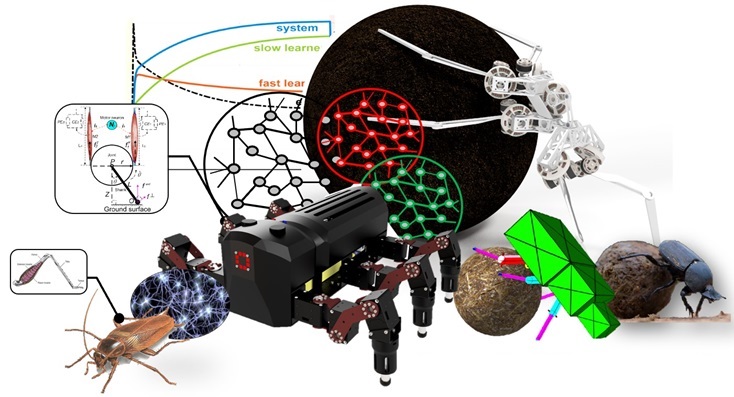This program has a flexible start and length.
Preferred student profile
Bachelor/Master student in Robotics, Computer Science, Mechatronics, Mechanical Engineering, Electrical Engineering, Computer Engineering, Artificial Intelligence, Autonomous systems, Physics, or other closely related fields.
Background and interest in one or more of the following fields:
- Autonomous-lifelong learning for robotic systems,
- Bio-inspired robotics,
- Soft robotics,
- Biorobotics,
- Embodied artificial intelligence,
- Machine learning for robotics,
- Neural locomotion control of walking machines,
- Biomechanics,
- Neural learning/plasticity and memory,
- Embodied cognitive systems,
- Explainable artificial intelligence (XAI),
- Exoskeletons,
- Human robotics,
- human-machine interaction,
- Autonomous drones
Maximum number of students to host: 5
Description
Living creatures, like walking animals, impress the observer by the elegance of their locomotion. They can also continuously learn and quickly adapt to new situations or solve specific tasks. They can even exploit their morphology to perform diverse complex autonomous behaviors, such as locomotion, object manipulation and transportation, and navigation, with a high degree of energy efficiency.
To achieve such complex behaviors for artificial walking systems, we focus on the Embodied Neurorobotics approach. The approach not only (i) considers an integration of neural systems, body, and often the environment, but also (ii) focuses on the detailed dynamical interactions of the neural computation (i.e., activity, plasticity, and memory at different time scales) with the environment to realize and generalize complex autonomous robot behaviors towards lifelong autonomous systems. By doing so, we aim to also understand the complex dynamical interactions between physical and computational components in embodied neural closed-loop systems.
Finally, we transfer our knowledge and development to other systems, such as service robots and exoskeletons, as well as to other application areas, such as service, construction, inspection, transportation, search and rescue, planetary exploration, and agriculture.
The students who participate will be involved in an innovative research environment and will have the opportunity to use an advanced machine learning research platform ADLife, to investigate and develop advanced machine learning methods for efficient and robust autonomous lifelong learning of complex robots in dynamically changing real-world environments.
According to the assigned topic, applicants will define a tailored project with their supervisors. The valuable outcomes of the projects will be presented in high-rank internationally recognized conferences and journals.
